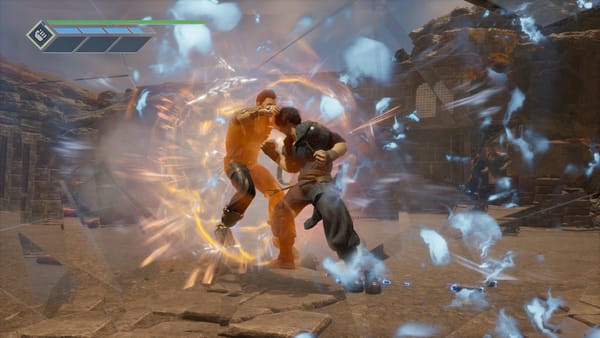#225: After the unboxing
Sounding a rare note of sympathy after a miserable few days for Microsoft.
Argh! Argh and bugger and argh, so sorry this is late. The children have been back in school for five minutes, so obviously have begun bringing home diseases. This week I have been mostly in bed.
So then, this Microsoft business. In case you’ve somehow missed it, on Monday night an absolute treasure trove of documentation was accidentally published in the Microsoft v FTC case. It pretty much spills the Xbox division’s entire strategy until 2030 — unannounced games, mid-gen and next-gen hardware plans, a new controller and a return of the whole ‘power of the cloud’ thing, to name but a few — as well as a tranche of internal discussions that reveal what, for Microsoft, will be an uncomfortable amount of information on how it views its competitors, gets games onto Game Pass, and generally runs its operation day to day. I simply cannot be doing with linking to everything individually, because there is so much of it and the dog is giving me the ‘walkies’ eyes. Thankfully The Verge has a very thorough round-up of it all.
At first I found it all quite overwhelming. This is, after all, the motherload. It is, like, five E3s, a couple of protracted court cases and a detailed Bloomberg exposé’s worth of news, and I am but one man. The few remaining properly staffed corners of the games media have really gone to town with this stuff, poring over every detail like it was the Panama Papers or something, which in a way I suppose it is. And good for them! Hit Points may have some complicated Thoughts and Feelings about today’s internet, and the games media’s corner of it. But equally, Hit Points would not really exist without other people’s hard work reporting news for me to analyse, provide useful context around, and take the piss out of. They walk so I can run. Or, when I’m carrying a cold in a seismic week for videogame news, they run so I can wheeze, and sigh, and sadly slope off for a lie down.
My overriding reaction to all this is an emotion that has been in rather short supply in Hit Points’ discussions of Microsoft of late: sympathy. (Gosh, I really must be ill.) As fascinating as this all is, and tempting as it is to poke fun at all those missed release dates, to mock Phil Spencer’s delusion that Nintendo would be better off if Microsoft bought it, or to spit venom at the Xbox division’s terribly uninspiring, and quite worrying, plans for future hardware, really I just feel kind of bad for Spencer and his crew. They are already languishing in third place, and this week’s revelations will only make their attempt to catch up to the competition even harder.
To state the blindingly obvious, Microsoft — or whichever legal firm it has been paying thousands of dollars an hour to inadvertently leak its entire business plan — is staring down the barrel of a decade-long marketing nightmare. How on Earth is team Xbox supposed to get its audience excited about what it has coming down the pipe? Even if we take Spencer at his word, and accept that these are old plans that have changed over time — and ignore the uncomfortable questions that would raise about why they were submitted to the FTC in the first place — he and his team still have to navigate the audience’s assumption that, when an E3 or similar rolls around, Xbox will have nothing to show them that they do not already know about. Surprise and delight, so often trotted out to describe the relationship between the game biz and its consumers, are now firmly off the table.
Spencer faces a similar sort of challenge internally. It is often overlooked, I think, that it is not only videogame fans that live for the hype and bluster that fuels the game industry; workers feed on it as well. The Edge team once received a grateful email from a Japanese studio after we’d put its game on the cover, saying the buzz and interest it had sparked online had freshly motivated the development team for the hard last push to get the thing shipped. And I know enough people working for platform holders to know that the vibe is the same around E3 showcases and Gamescom booths, hardware announcements and big game releases and all that. How Spencer keeps his teams up for the fight when a decade’s worth of their secrets have been revealed — particularly when some of the most important ones have been met with what we might charitably call a lukewarm response — is in many ways the biggest challenge he faces in the aftermath of all this.
Similarly, his sprawling group of firstparty studios will need a reassuring arm around their shoulders. One of the leaked emails reveals a Microsoft executive had raised concerns with Spencer about a potential “bloodbath” of studio closures if things didn’t go to plan. We know from the leaked release schedule, with its litany of delays — in some cases of games that haven’t even been announced yet, but should have been on shelves by now — that things definitely have not worked out as intended. Microsoft’s only hope of fixing the yawning chasms in its release calendar is ensuring its development teams are happy and motivated, and feel supported. After this week’s revelations I imagine many will be too busy looking over their shoulders for the axeman to really knuckle down with their work.
The firstparty operation should, when working as designed, be the lifeblood of Game Pass, stocking the subscription catalogue with a regular supply of console-exclusive bangers. But while the Xbox Studios group has been struggling to hit its goals, Microsoft has leant (and spent, it turns out) heavily on thirdparties, signing high-profile, if not necessarily high-quality, titles to the service to plug the gaps. Now, thanks to a leaked email exchange between Spencer and his leadership team, we have an unprecedented degree of insight into the sums involved, from a lowly $5m for various indie games to $50m for Dying Light 2 and $300m for Star Wars Jedi: Survivor (with a note that EA would never agree to it). I can guarantee that game companies the world over have looked at that list, realised they got short-changed the last time they put one of their titles onto Game Pass, and have resolved to negotiate harder next time around — if there even is a next time. Fold in Spencer’s admission in another email that the Starfield delay last year was “a disaster” and Microsoft’s hand looks even weaker. Nothing inflates a price-tag quite like the whiff of desperation.
Then, of course, there is the corporate-warfare side of things. Sony now knows, at the very least, what Microsoft has been thinking about doing with Xbox hardware over the next decade; even if its plans have changed since, that is still tremendously valuable insight for Sony as it scopes out its vision for PS6. Nintendo, meanwhile, will surely have bristled at the email in which Spencer mulls over the possibility of a friendly US investor, that has been quietly increasing its stake in Nintendo, pushing for a sale in the coming years. I doubt Gabe Newell is all that bothered at the news that Microsoft has been mulling over trying to buy Valve, but it complicates the relationship regardless. And of course the airing of all this dirty laundry makes future acquisition targets a little less likely to take Microsoft’s calls.
What a dreadful mess, all told, and I certainly do not envy Spencer the clean-up job upon which he must now embark. But there are certainly limits to my sympathy. Between the lines of the leaked emails is a worrying knowledge gap — a suggestion that, while Microsoft understands its own place in the game industry, it may not have the firmest handle on things outside its walls. Thinking, even in mid-2022, that Baldur’s Gate 3 could have been signed to Game Pass for just $5m betrays a worrying lack of understanding of how eagerly anticipated it was, how high Larian’s stock had risen among PC players in particular, and how well the game was doing in Early Access.
Similarly, the idea that Nintendo is somehow ignorant to how much better off it would be under Microsoft’s wing — expressed in an email Spencer sent two days after Switch sales passed 61m units — suggests a troubling selective blindness on Microsoft’s part. And as for the notion that getting Suicide Squad on Game Pass would be worth $250m… well, we are truly in the realms of fantasy now, I fear. You’d expect Team Xbox to understand its own business the most intimately, sure, but there’s an ignorance of broader industry context here that I find quite surprising, and most disappointing. Someone really ought to tell these cats about Hit Points.
Sadly, any remaining sympathy simply evaporates when we come to Microsoft’s hardware plans. The mid-gen Series X refresh comes with neither a power boost nor a price cut, and exchanges higher onboard storage for the loss of an optical disc drive. The next-gen vision talks airily of machine learning and ominously hypes up what it calls “cloud hybrid games”. It all smells very much like the bad old days of Xbox One, reigniting the same old arguments about the death of ownership, about always-online games whose lifespans are dictated by how long Microsoft feels like keeping the servers running. I don’t think any of us were so naive as to think that these ideas died the day Don Mattrick left, but it is nonetheless pretty deflating to see it all written down in this way. Sure, these are internal documents, intended solely to get a corporation’s collective juices flowing. But there was nothing there for the likes of you and I to get particularly excited about, just plenty of stuff to fear.
It is not all bad news for Microsoft, mind you. There is an opportunity here as well. The leaks should be seen as a test balloon: as a chance, however accidental, for Microsoft to float some potential future plans past the Xbox community and the wider industry and see how they land. That they have not gone over especially well should, you’d hope at least, prompt a bit of a rethink. The Xbox One fiasco showed Microsoft that a single day of mistakes can take a decade to clear up. Spencer has been down this road before; this time, at least, there’s still time for him and his crew to change course.
MORE!
Lawd, that went on a bit. Let’s try and rattle through the week’s non-Xbox news before today’s deadline.
- Late on Sunday evening Unity’s Twitter account deployed the industry-standard ‘we’re sorry and we’re listening’ shtick after a week of developer outcry over its proposed new Runtime Fee. Despite promising an update “in a couple of days” — and despite this being an excellent week to bury bad news, you’d have thought — at the time of writing there’s been no official word on a climbdown. Bloomberg reckons concessions are coming, though if Unity thinks there’s any way out of this that doesn’t involve throwing the whole stupid idea in the bin, it’s even dumber than we all thought.
- The UK’s Competition and Market Authority plans to rule on Microsoft’s revised plan for Acquisition Blizzard next week, The Verge says.
- PS5 is having a lovely old time of it in Europe, with hardware sales in August jumping by almost 200% over the previous month.
- Bad news for those of us who pine for the glory days of arcade racers a couple of times a week: Criterion, once the revered developer of the Burnout series, is now working fulltime on Battlefield. Bah.
- Dead Space co-creator Glen Schofield is moving on from Striking Distance Studios after the commercial failure of its Dead Space-alike The Callisto Protocol. Glen may look like someone crossed the world’s meanest nightclub bouncer with an outhouse and a drill sergeant, but he’s an absolute sweetheart in the flesh, and Hit Points wishes him well with whatever’s next.
- The Embracer bloodbath — sorry, the Embracer restructure — continues with news of layoffs at Crystal Dynamics.
- Lego Piranha Plant, you say? Don’t mind if I do.
- Did you know Takashi Miike was making an anime adaptation of Onimusha for Netflix? I certainly didn’t. Here’s a trailer.
That’ll do! A few hours of consulto-stuff before the school run, followed by an evening with the new Cyberpunk update. Lovely stuff. Paid subs, I’ll see you tomorrow. If the rest of you would like to join us for a modest monthly fee, you may do so by clicking the button below exactly six times. (Actually just once is fine, but if you do it six times you will be invited to a Secret Club.) Cheerio!





